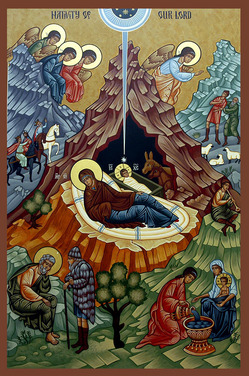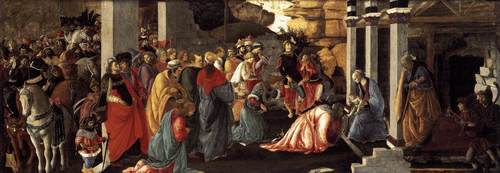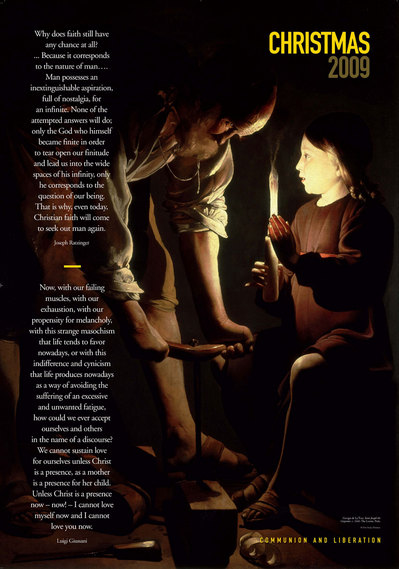Advent & Christmastide: December 2009 Archives
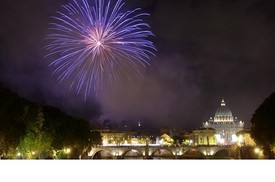 Now is the old year passed away.
Now is the old year passed away.Let us begin the new this day.
Praising our God, who here on earth
Kept us in quietness and mirth!
Oh, like the glad new year may we
Wholly renewed this day be,
Praising our God eternally!
Child of our love, O Jesus dear,
Thou who art still our Savior here,
Thee do we pray with all our heart:
Never more leave us, nor depart.
Save us from war, from hate, from fear;
Keep us in peace together here;
Grant us a tranquil, joyous year!
Gladly together then will we,
O highest God of heaven, to thee
Bring through the year our songs of praise,
And evermore through endless days
Here will on earth our time shall be,
And then, throughout eternity,
Singing with joyful hearts to Thee!
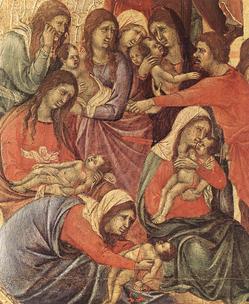 Our soul has been rescued like a bird from the fowler's snare.
Our soul has been rescued like a bird from the fowler's snare.
Father, the Holy Innocents offered you praise by the death they suffered for Christ. May our lives bear witness to the faith we profess with our lips.
from the Directory of Popular Piety and the Liturgy: The Feast of the Holy Innocents
Since the sixth century, on December 28, the Church has celebrated the memory of those children killed because of Herod's rage against Christ (cf. Mt 2:16-17). Liturgical tradition refers to them as the "Holy Innocents" and regards them as martyrs. Throughout the centuries Christian art, poetry and popular piety have enfolded the memory of the "tender flock of lambs" with sentiments of tenderness and sympathy. These sentiments are also accompanied by a note of indignation against the violence with which they were taken from their mothers' arms and killed.
In our own times, children suffer innumerable forms of violence which threaten their lives, dignity and right to education. On this day, it is appropriate to recall the vast host of children not yet born who have been killed under the cover of laws permitting abortion, which is an abominable crime. Mindful of these specific problems, popular piety in many places has inspired acts of worship as well as displays of charity which provide assistance to pregnant mothers, encourage adoption and the promotion of the education of children.
As recorded in the gospel of Matthew, after the visit of the Magi, Herod, in rage and jealousy, slaughtered all the baby boys in Bethlehem and surrounding countryside in an attempt to destroy his perceived rival, the infant Messiah. These "innocents" are honored by the Church as martyrs.
In countries where our own innocents are daily being slaughtered by abortion, this feast day is a special time to remember the unborn, to pray for their cause, and perhaps to picket or pray at facilities where unborn babies are killed through abortion. (113)
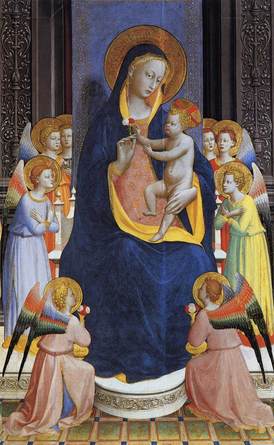
In Mary we praise that which places her above all others,
that is, fruitfulness of offspring together with virginity. For never has it
been known in this world that anyone was at the same time mother and virgin.
And see of Whom she is mother. Where does your astonishment at this so wondrous
dignity lead you? Is it not to this, that you may gaze in wonder yet never
sufficiently revere? Is she not in your veneration, no, in the esteem of Truth
itself, raised above choirs of angels? Does not Mary address the Lord and God
of all the angels as Son, saying: Son, why have you done so to us?
Who among the angels may thus presume? It is enough for them, and for them their greatest honor, that while they are spirits by nature they have become and are called angels, as David testifies: Who makes your angels spirits. [Ps.103: 4] Mary, knowing herself a mother, with confidence calls that Majesty Son Whom the angels in reverence serve. Nor does God disdain to be called that which He disdained not to be. For the Evangelist adds a little later: He was subject to them.
Who was subject to whom? A God to men. God, I repeat, to Whom are the angels subject: Whom principalities and powers obey: subject to Mary; and not alone to Mary, but to Joseph also, because of Mary. Admire and revere both the one and the other, and choose which you admire the more: the most sweet condescension of the Son, or the sublime dignity of the Mother. For either am I at a loss for words: for both are wondrous. For that God should obey a woman is humility without compare; and that a woman should have rule over God dignity without equal. In praise of virgins is it joyfully proclaimed: that they follow the lamb withersoever he goes. [Rev. 14: 4] Of what praise shall you esteem her worthy who also goes before Him?
Learn, O Man, to obey. Learn, O Earth, to be subject. Learn, O
Dust, to submit. The Evangelist in speaking of his Maker says: He was subject
to them; that is, without doubt, to Mary and to Joseph. Be you ashamed, vain
ashes that you are. God humbles Himself, and do you exalt yourself? God becomes
subject to men, and will you, eager to lord it over men, place yourself above
your Maker? O would that God might deign to make me, thinking such thoughts at
times in my own mind, such answer as He made, reproving him, to His apostle: Get behind me, Satan: because you savor not the things that are of God. [Mark 8:
33]
For as often as I desire to be foremost among men, so often do I seek to take precedence of God; and so do I not truly savor the things that are of God. For of Him was it said: And he was subject to them. If you disdain, O Man, to follow the example of a Man, at least it will not lower thee to imitate thy Maker. If perhaps you cannot follow Him wheresoever He goes, at least follow in that wherein He has come down to you.
If you are unable to follow Him on the sublime way of virginity, then follow God by that most sure way of humility; from whose straightness should some even from among the virgins go aside, then must I say what is true, that neither do they follow the Lamb to wherever he goes. He that is humble, even though he be stained, he follows the Lamb; so too does the proud virgin; but neither of the two whithersoever He goes: because the one cannot ascend to the purity of the Lamb that is without stain, nor will the other deign to come down to the meekness of the Lamb, Who stood silent, not merely before the shearer, but before the one that put Him to death. Yet the sinner [you and me] who follows Him in humility, has chosen a more wholesome part than the one that is proud in his virtue; since the humble repentance of the one washes away uncleanness, but the pride of the other contaminates his own virtue.
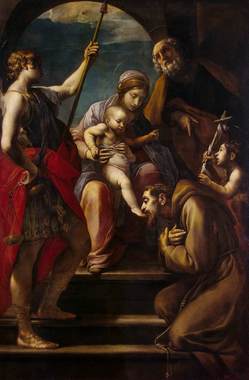
Truly blessed was Mary who possessed both humility and virginity. And truly wondrous the virginity of those whose fruitfulness is not stained, but adorned her; and truly singular the humility, which this fruitful virginity has not troubled, but rather exalted; and wholly incomparable the fruitfulness which goes hand in hand with her humility and her virginity. Which of these things is not wondrous? Which is not beyond all comparison? Which that is not wholly singular? It would be strange if you did not hesitate to decide which you regard as most worthy of praise: whether the wonder of fruitfulness of offspring in virginity, or of virginal integrity in a mother: sublimity of Offspring, or humility joined to such dignity: unless it be that we place both together above each one singly: and it is truly beyond any doubt more excellent and more joyful to have beheld these perfections united in her, than to see but one part of them.
And can we wonder that God, of
Whom it is written that He is wonderful in his saints, [Ps. 67: 36] shows
Himself in His own Mother yet more wondrous still. Venerate then, Ye spouses,
this integrity of flesh in our corruptible flesh. Revere likewise, you virgins,
fruitfulness in virginity. Let all men imitate the humility of God's Mother.
Honor, you angels, the Mother of your King, you who adore the Offspring of our
Virgin; Who is your King and our King, the Healer of our race, the Restorer of
our fatherland: Who among you is so sublime, yet among us was so lowly: to
Whose Majesty as well from you as from us let there be adoration and reverence:
to whose Perfection be there honor and glory and empire for ever and ever.
Amen.
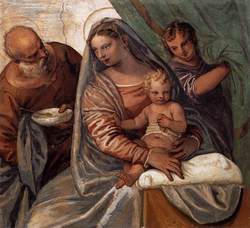 Father, help us to live as a holy family, united in
respect and love. Bring us to the joy and peace of your eternal home.
Father, help us to live as a holy family, united in
respect and love. Bring us to the joy and peace of your eternal home.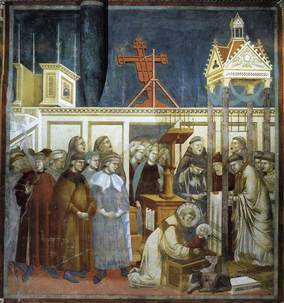
Lux fulgebit hodie super nos, quia natus est nobis Dominus.
(A light will shine on us this day, the Lord is born for us.)
(Roman Missal, Christmas, Entrance Antiphon for the Mass at Dawn)
The liturgy of the Mass at Dawn reminded us that the night is now past, the day has begun; the light radiating from the cave of Bethlehem shines upon us.
The Bible and the Liturgy do not, however, speak to us about a natural light, but a different, special light, which is somehow directed to and focused upon "us", the same "us" for whom the Child of Bethlehem "is born". This "us" is the Church, the great universal family of those who believe in Christ, who have awaited in hope the new birth of the Savior, and who today celebrate in mystery the perennial significance of this event.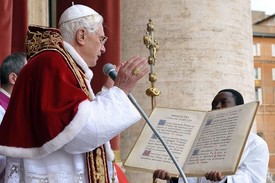 At first, beside the manger in Bethlehem, that "us" was almost imperceptible to human eyes. As the Gospel of Saint Luke recounts, it included, in addition to Mary and Joseph, a few lowly shepherds who came to the cave after hearing the message of the Angels. The light of that first Christmas was like a fire kindled in the night. All about there was darkness, while in the cave there shone the true light "that enlightens every man" (Jn 1:9). And yet all this took place in simplicity and hiddenness, in the way that God works in all of salvation history. God loves to light little lights, so as then to illuminate vast spaces. Truth, and Love, which are its content, are kindled wherever the light is welcomed; they then radiate in concentric circles, as if by contact, in the hearts and minds of all those who, by opening themselves freely to its splendour, themselves become sources of light. Such is the history of the Church: she began her journey in the lowly cave of Bethlehem, and down the centuries she has become a People and a source of light for humanity. Today too, in those who encounter that Child, God still kindles fires in the night of the world, calling men and women everywhere to acknowledge in Jesus the "sign" of his saving and liberating presence and to extend the "us" of those who believe in Christ to the whole of mankind.
At first, beside the manger in Bethlehem, that "us" was almost imperceptible to human eyes. As the Gospel of Saint Luke recounts, it included, in addition to Mary and Joseph, a few lowly shepherds who came to the cave after hearing the message of the Angels. The light of that first Christmas was like a fire kindled in the night. All about there was darkness, while in the cave there shone the true light "that enlightens every man" (Jn 1:9). And yet all this took place in simplicity and hiddenness, in the way that God works in all of salvation history. God loves to light little lights, so as then to illuminate vast spaces. Truth, and Love, which are its content, are kindled wherever the light is welcomed; they then radiate in concentric circles, as if by contact, in the hearts and minds of all those who, by opening themselves freely to its splendour, themselves become sources of light. Such is the history of the Church: she began her journey in the lowly cave of Bethlehem, and down the centuries she has become a People and a source of light for humanity. Today too, in those who encounter that Child, God still kindles fires in the night of the world, calling men and women everywhere to acknowledge in Jesus the "sign" of his saving and liberating presence and to extend the "us" of those who believe in Christ to the whole of mankind.
Wherever there is an "us" which welcomes God's love, there the light of Christ shines forth, even in the most difficult situations. The Church, like the Virgin Mary, offers the world Jesus, the Son, whom she herself has received as a gift, the One who came to set mankind free from the slavery of sin. Like Mary, the Church does not fear, for that Child is her strength. But she does not keep him for herself: she offers him to all those who seek him with a sincere heart, to the earth's lowly and afflicted, to the victims of violence, and to all who yearn for peace. Today too, on behalf of a human family profoundly affected by a grave financial crisis, yet even more by a moral crisis, and by the painful wounds of wars and conflicts, the Church, in faithful solidarity with mankind, repeats with the shepherds: "Let us go to Bethlehem" (Lk 2:15), for there we shall find our hope.
The "us" of the Church is alive in the place where Jesus was born, in the Holy Land, inviting its people to abandon every logic of violence and vengeance, and to engage with renewed vigour and generosity in the process which leads to peaceful coexistence. The "us" of the Church is present in the other countries of the Middle East. How can we forget the troubled situation in Iraq and the "little flock" of Christians which lives in the region? At times it is subject to violence and injustice, but it remains determined to make its own contribution to the building of a society opposed to the logic of conflict and the rejection of one's neighbour. The "us" of the Church is active in Sri Lanka, in the Korean peninsula and in the Philippines, as well as in the other countries of Asia, as a leaven of reconciliation and peace. On the continent of Africa she does not cease to lift her voice to God, imploring an end to every injustice in the Democratic Republic of Congo; she invites the citizens of Guinea and Niger to respect for the rights of every person and to dialogue; she begs those of Madagascar to overcome their internal divisions and to be mutually accepting; and she reminds all men and women that they are called to hope, despite the tragedies, trials and difficulties which still afflict them. In Europe and North America, the "us" of the Church urges people to leave behind the selfish and technicist mentality, to advance the common good and to show respect for the persons who are most defenceless, starting with the unborn. In Honduras she is assisting in process of rebuilding institutions; throughout Latin America, the "us" of the Church is a source of identity, a fullness of truth and of charity which no ideology can replace, a summons to respect for the inalienable rights of each person and his or her integral development, a proclamation of justice and fraternity, a source of unity.
In fidelity to the mandate of her Founder, the Church shows solidarity with the victims of natural disasters and poverty, even within opulent societies. In the face of the exodus of all those who migrate from their homelands and are driven away by hunger, intolerance or environmental degradation, the Church is a presence calling others to an attitude of acceptance and welcome. In a word, the Church everywhere proclaims the Gospel of Christ, despite persecutions, discriminations, attacks and at times hostile indifference. These, in fact, enable her to share the lot of her Master and Lord.
Dear Brothers and Sisters, how great a gift it is to be part of a communion which is open to everyone! It is the communion of the Most Holy Trinity, from whose heart Emmanuel, Jesus, "God with us", came into the world. Like the shepherds of Bethlehem, let us contemplate, filled with wonder and gratitude, this mystery of love and light! Happy Christmas to all!
Benedictus PP XVI, Christmas 2009
There is a phrase of Dostoevsky that accompanies me these days, when I have to speak of Christianity to all kinds of people in Italy and abroad: "Can an educated man, a European of our time, believe--truly believe--in the divinity of the Son of God, Jesus Christ?" This question rings like a challenge for all of us. It is precisely on the answer to this question that the success of the faith depends today. In an address given in 1996, the then cardinal Ratzinger answered that faith can have this hope "because it finds a correspondence in human nature. In man there is a nostalgic hope for the infinite that cannot be extinguished." In this phrase he indicated the condition necessary: that Christianity needs to find the humanity that pulsates in each of us in order to show all the greatness of its claim.
Yet how many times are we tempted to look at the concrete humanity in which we find ourselves--for example the unease, the dissatisfaction, the sadness, the boredom--as an obstacle, a complication, an impediment to the realization of what we desire. Thus we get angry with ourselves and with reality, succumbing to the weight of circumstances, in the illusion of going ahead by cutting away a piece of ourselves. But unease, dissatisfaction, sadness, and boredom are not symptoms of a illness to treat with medicines; this happens more and more often in a society that mistakes disquiet of the heart for panic and anxiety. They are rather signs of what the nature of the "I" is. Our desire is greater than the whole universe. The perception of emptiness in us and around us of which Leopardi speaks ("want and emptiness"), and the boredom of which Heidegger speaks, are the proof of the inexorable nature of our heart, of the boundless character of our desire--nothing is able to give us satisfaction and peace. We can forget it, betray it, or even deceive it, but we cannot shuffle it off.
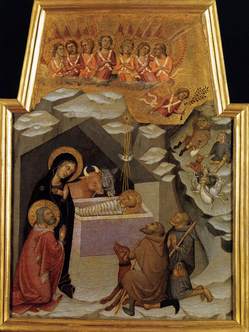
So the real obstacle on our journey is not our concrete humanity, but disregard for it. Everything in us cries out the need for something to fill the void. Even Nietzsche perceived this; he could not but address the "unknown god" that makes all things. "Left alone, I raise my hands/ ... to the unknown god / I want to know you, you the Unknown,/ Who penetrate deep into my soul, / Shake up my life like a storm,/ Beyond my grasp and yet so close to me!" (1864).
Christmas is the announcement that this unknown Mystery has become a familiar presence, without which none of us could remain a man for long, but would end up overwhelmed by confusion, seeing his own face decompose, because "only the divine can 'save' man, that is to say, the true and essential dimensions of the human figure and his destiny" (Fr. Giussani).
The most convincing sign that Christ is God, the greatest miracle that astonished everyone--even more than the healing of cripples and the curing of the blind--was an incomparable gaze. The sign that Christ is not a theory or a set of rules is that look, which is found throughout the Gospel: His way of dealing with humanity, of forming relationships with those He met on His way. Think of Zacchaeus and of Magdalene: He didn't ask them to change, but embraced them, just as He found them, in their wounded, bleeding humanity, needful of everything. And their life, embraced, re-awoke in that moment in all its original profundity. Who would not want to be reached by such a look now? For "one cannot keep on living unless Christ is a presence like a mother is a presence for her child, unless Christ is a presence now - now! -I cannot love myself now and I cannot love you now" (Fr. Giussani). This is the only way, as men of our time, reasonably and critically, to answer Dostoevsky's question.
But how do we know that Christ is alive now? Because his gaze is not a fact of the past, but is still present in the world just as it was before. Since the day of His resurrection, the Church exists only in order to make God's affection an experience, through people who are His mysterious Body, witnesses in history today of that gaze capable of embracing all that is human.
Father Julián Carrón, President of the Fraternity of Communion & Liberation
Corriere della Sera, 24 December 2009
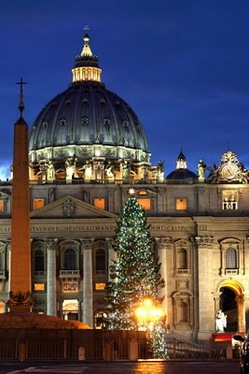 The Pope received the bishop and a delegation from Wallonia, from
where this year's Vatican Square Christmas tree came from, to say thank you for gift on behalf of the Church. He said, "The role
of this tree is similar to that of the shepherds who, watching through the
shades of night, saw how the darkness was illuminated with the message of the
angels. ... Standing next to the nativity scene the tree indicates, in its own
particular way, the great mystery present in the poor and simple grotto. It
proclaims the arrival of the Son of God to the inhabitants of Rome, to pilgrims
and to everyone who sees St. Peter's Square on television. Though this tree
your land, and the faith of the Christian communities in your region, greet the
Christ Child." (Benedict XVI)
The Pope received the bishop and a delegation from Wallonia, from
where this year's Vatican Square Christmas tree came from, to say thank you for gift on behalf of the Church. He said, "The role
of this tree is similar to that of the shepherds who, watching through the
shades of night, saw how the darkness was illuminated with the message of the
angels. ... Standing next to the nativity scene the tree indicates, in its own
particular way, the great mystery present in the poor and simple grotto. It
proclaims the arrival of the Son of God to the inhabitants of Rome, to pilgrims
and to everyone who sees St. Peter's Square on television. Though this tree
your land, and the faith of the Christian communities in your region, greet the
Christ Child." (Benedict XVI)
O King of Great Counsel, You joined Your admirable power with the prudence of human judgment when You, the Mighty and All-Powerful God, fled into Egypt from the face of Herod. We beseech You, through Your Pure Nativity and through the intercession of Your Mother and Saint Joseph, Your Chosen One, to grant us good judgment in all our actions, that we may think and act wisely all the days of our lives as we subject ourselves to Your divine service. Amen.
Bethlehem, make ready,
for Eden has been opened for all.
Ephrathah, be alert,
for the Tree of Life has blossomed forth
from the Virgin in the cave.
Her womb has become a spiritual paradise
wherein the Divine Fruit was planted,
and if we eat of it,
we shall live and not die like Adam.
Christ is coming forth to bring back to life
the likeness that had been lost in the beginning.
Bethlehem, make ready, for Eden has been opened for all!
(a Byzantine poetic text for the time before the Nativity of the Lord)
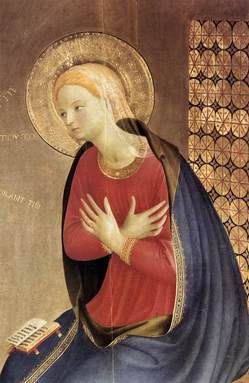 We have all had the occasion by a moment to sense more
intensely the presence of Christ in the Eucharist during the celebration of the
Mass, during Eucharistic adoration, or even in the Tabernacle, when we walk
into a church. There is Christ. He is there whether we sense or experience His
presence. But precisely because this is the case, we are sometimes given
to experience that He is present. Such experience is not the source of faith,
but in some way it is its consequence.
We have all had the occasion by a moment to sense more
intensely the presence of Christ in the Eucharist during the celebration of the
Mass, during Eucharistic adoration, or even in the Tabernacle, when we walk
into a church. There is Christ. He is there whether we sense or experience His
presence. But precisely because this is the case, we are sometimes given
to experience that He is present. Such experience is not the source of faith,
but in some way it is its consequence.O Wine of Virgins and Lily of Purity, Who by a touch of Your hand heals the body and cleanses the soul; Who by dwelling in the womb of Your Mother has made her the purest of the pure and most admirable among virgins; We beseech You, through Your Pure Nativity and through the intercession of Your Mother and Saint Joseph, Your Chosen One, to grant us to be pure in soul and body and clean in act clean and thought, that we may serve You with a clean heart and pure body all the days of our lives. Amen.
O Admirable Leader Who gains the obedience of Your people not by the severity of Your judgment but by the sweetness of Your love and Your welcome sojourn among us. We beseech You, through Your Pure Nativity and through the intercession of Your Mother and Saint Joseph, Your Chosen One, to teach us complete obedience to Your holy commandments and to submit to our superiors, not for fear of punishment but by a willing surrender of mind and heart, with gladness of heart and spirit. Amen.
O Hope of the Patriarchs and longing of the Gentiles, in Your Nativity You have granted us hope. The joy of this hope has called together the Shepherds, the Magi and all believers in Your Holy Name, and led them to adore You with all the acclaim of their hearts. We beseech You, through Your Pure Nativity and through the intercession of Your Virgin Mother and Saint Joseph, Your Chosen One, to keep us, by Your grace, from attachment to earthly goods. Teach us not to depend only on ourselves and the weak ones of this world, but to rely only on Your Fatherly direction and Your Divine Providence. Attract our hearts and minds to reflect on Your heavenly riches and to aspire and long for them above. Amen.
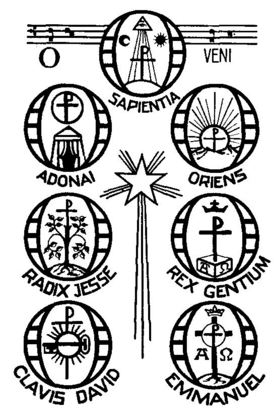
Advent slightly shifts its focus beginning tomorrow (December 17) when the antiphons for Vespers known as the Greater Antiphons, but more commonly known as the O Antiphons, are sung.
These biblical texts are sung as the verse introducing the Magnificat song at Vespers. Most people know these Great Antiphons as the hymn called "O Come, O Come Emmanuel" (Veni, Veni, Emmánuël). Each verse of the hymn is a reworded version of the O Antiphons, with the last being the first verse. Rather unfortunately too many priests and church musicians/choir leaders have little understanding of why one would hold off from signing "O Come, O Come Emmanuel" at Mass until this time of Advent, and even then, why one would spread the verses out over the days ahead. (I wonder if we can get our act together to respect the Liturgy and its history to allow the flourishing of the theology to dig more deeply into our hearts and minds.)
Each O Antiphon addresses Jesus with a title which comes from the prophecies of Isaiah that anticipate the coming of the Messiah. The first letters of the titles in the original Latin in reverse order spell "Ero Cras," meaning "Tomorrow, I will come."
December 17 - O Sapiéntia: O Wisdom Who camest out of the mouth of the Most High, reaching from end to end and ordering all things mightily and sweetly: come and teach us the way of prudence.
December 18 - O Adonái: O Adonai, and Leader of the house of Israel, Who didst appear to Moses in the flame of the burning bush, and didst give unto him the law on Sinai: come and with an outstretched arm redeem us.
December 19 - O Radix Jesse: O Root of Jesse, Who standest for an ensign of the people, before Whom kings shall keep silence, and unto Whom the Gentiles shall make their supplication: come to deliver us, and tarry not.
December 20 - O Clavis David: O Key of David, and Sceptre of the house of Israel, Who openest and no man shutteth, Who shuttest and no man openeth: come and bring forth from his prison-house, the captive that sitteth in darkness and in the shadow of death.
December 21 - O Óriens: O Dawn of the East, Brightness of the light eternal, and Sun of justice: come and enlighten them that sit in darkness and in the shadow of death.
December 22 - O Rex Gentium: O King of the Gentiles and the Desired of them, Thou Corner-stone that makest both one: come and deliver man, whom Thou didst form out of the dust of the earth.
December 23 - O Emmánuël: O Emmanuel, our King and Lawgiver,
the Expected of the nations and their Savior: come to save us, O Lord our God.
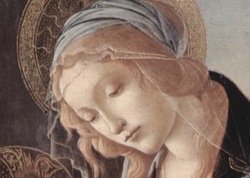 It is truly meet and just, right and available to
salvation, that we should give thanks to thee, O Lord God, almighty: and that we
should, whilst invoking Thy power, celebrate the feasts of the blessed Virgin
Mary; from whose womb grew the Fruit, which has filled with the Bread of
angels. That Fruit which Eve took from us when she sinned, Mary has restored to
us, and it has saved us. Not as the work of the serpent is the work of Mary. From
the one, came the poison of our destruction; from the other, the mysteries of
salvation. In the one, we see the malice of the tempter; in the other, the help
of the divine Majesty. Be the one, came death to the creature; by the other the
resurrection of the Creator, by whom human nature, now not captive but free, is
restored; and what it lost by its parent Adam, it regained by its Maker Christ.
It is truly meet and just, right and available to
salvation, that we should give thanks to thee, O Lord God, almighty: and that we
should, whilst invoking Thy power, celebrate the feasts of the blessed Virgin
Mary; from whose womb grew the Fruit, which has filled with the Bread of
angels. That Fruit which Eve took from us when she sinned, Mary has restored to
us, and it has saved us. Not as the work of the serpent is the work of Mary. From
the one, came the poison of our destruction; from the other, the mysteries of
salvation. In the one, we see the malice of the tempter; in the other, the help
of the divine Majesty. Be the one, came death to the creature; by the other the
resurrection of the Creator, by whom human nature, now not captive but free, is
restored; and what it lost by its parent Adam, it regained by its Maker Christ.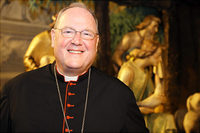 Today the NY Daily News published a letter written by Archbishop Timothy M. Dolan, archbishop of New York. I am happy that the News published this letter because it is not only a message for Christians, but people of faith, and those looking for the gift of faith. The substance of the Archbishop's letter can be summarized in this way: this is a time for peace among peoples; for love and reconciliation. And even though not all go about observing this season in the same way, we ought to respect one another!
Today the NY Daily News published a letter written by Archbishop Timothy M. Dolan, archbishop of New York. I am happy that the News published this letter because it is not only a message for Christians, but people of faith, and those looking for the gift of faith. The substance of the Archbishop's letter can be summarized in this way: this is a time for peace among peoples; for love and reconciliation. And even though not all go about observing this season in the same way, we ought to respect one another! 